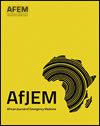南非夸祖鲁-纳塔尔省紧急护理提供者对产科出血的知识、态度和做法:一项横断面研究
IF 1.2
4区 医学
Q3 EMERGENCY MEDICINE
引用次数: 0
摘要
背景产科出血(OH)是全世界孕产妇死亡的主要原因。南非卫生部建议,所有分娩应由能够识别和处理并发症的熟练人员进行管理,以减少孕产妇、围产期和新生儿的不良后果。急诊服务提供者是受命履行这一职责的院前工作人员;然而,对他们的知识,态度和实践(KAP)对OH紧急情况知之甚少。本研究评估了南非夸祖鲁-纳塔尔省(KZN) EC提供者关于OH管理的知识(特别是病理生理学、诊断和治疗)、态度和做法。方法在KZN 11个区的指定中心地点对公共部门EC提供者进行了横断面KAP调查,参与者代表各自地区的多个救护站。数据通过结构化问卷收集,417名参与者在2022年7月至2023年8月期间注册。采用改良的Bloom分界点编制KAP分数,进行分类评估。数据分析包括描述性统计和推断性统计。结果417例患者以男性为主(75.3 %,n = 314)。年龄≥40岁(66.4%,n = 277)居多,年龄在18 ~ 60岁之间。对于健康护理,95.7%的人表现为知识贫乏,65.5%的人表现为积极态度,96.6%的人表现为行为不良。Kruskal-Wallis检验(p < 0.001)显示知识得分因资格水平的不同而有很大差异。逻辑回归显示,学历越高,知识、态度和行为越好。结论有针对性的技能提升和强制性产科模拟需要在KZN的EC提供者缩小知识和实践差距。尽管态度积极,但电子商务提供者在OH管理方面表现出较差的知识和实践。这些缺点似乎受到系统和背景障碍的影响,需要进一步调查。然而,我们的研究结果强调了持续的、有针对性的培训和EMS支持对于解决紧急情况下的关键差距和改善产科结果的重要性。本文章由计算机程序翻译,如有差异,请以英文原文为准。
Knowledge, attitude and practice of emergency care providers on obstetric haemorrhage in KwaZulu-Natal, South Africa: A cross-sectional study
Background
Obstetric haemorrhage (OH) is a leading cause of maternal deaths worldwide. The South African Department of Health recommends that all childbirths be managed by skilled personnel who can identify and manage complications to reduce adverse maternal, perinatal and neonatal outcomes. Emergency Care (EC) providers are prehospital personnel mandated to fulfil this role; however, little is known about their knowledge, attitudes and practices (KAP) for OH emergencies. This study assesses EC providers’ knowledge (specifically pathophysiology, diagnosis and treatment), attitude and practices regarding OH management in KwaZulu-Natal (KZN), South Africa.
Methods
A cross-sectional KAP survey was administered to public-sector EC providers at designated central locations in each of the 11 KZN districts, with participants representing multiple ambulance stations in their respective districts. Data were collected through a structured questionnaire completed by 417 participants enrolled between July 2022 and August 2023. Modified Bloom’s cut-off points were used to develop KAP scores, enabling categorical assessment. Data analysis included descriptive and inferential statistics.
Results
Participants (n = 417) were predominantly male (75.3 %, n = 314). The majority were aged ≥40 years (66.4 %, n = 277), ranging from 18 to 60 years. Regarding OH, 95.7 % demonstrated poor knowledge, 65.5 % a positive attitude and 96.6 % poor practices. The Kruskal-Wallis test (p < 0.001) showed knowledge scores varied substantially by qualification level. Logistic regression indicated higher qualifications were associated with better knowledge, attitude and practices.
Conclusion
Targeted up-skilling and mandatory obstetric simulation for EC providers in KZN are needed to close knowledge-practice gaps. Despite a positive attitude, EC providers demonstrated poor knowledge and practices in OH management. These shortcomings appear influenced by systemic and contextual barriers and require further investigation. Nevertheless, our findings highlight the importance of sustained, targeted training and EMS support to address critical gaps and improve obstetric outcomes in emergency settings.
求助全文
通过发布文献求助,成功后即可免费获取论文全文。
去求助
来源期刊

African Journal of Emergency Medicine
EMERGENCY MEDICINE-
CiteScore
2.40
自引率
7.70%
发文量
78
审稿时长
85 days
 求助内容:
求助内容: 应助结果提醒方式:
应助结果提醒方式:


